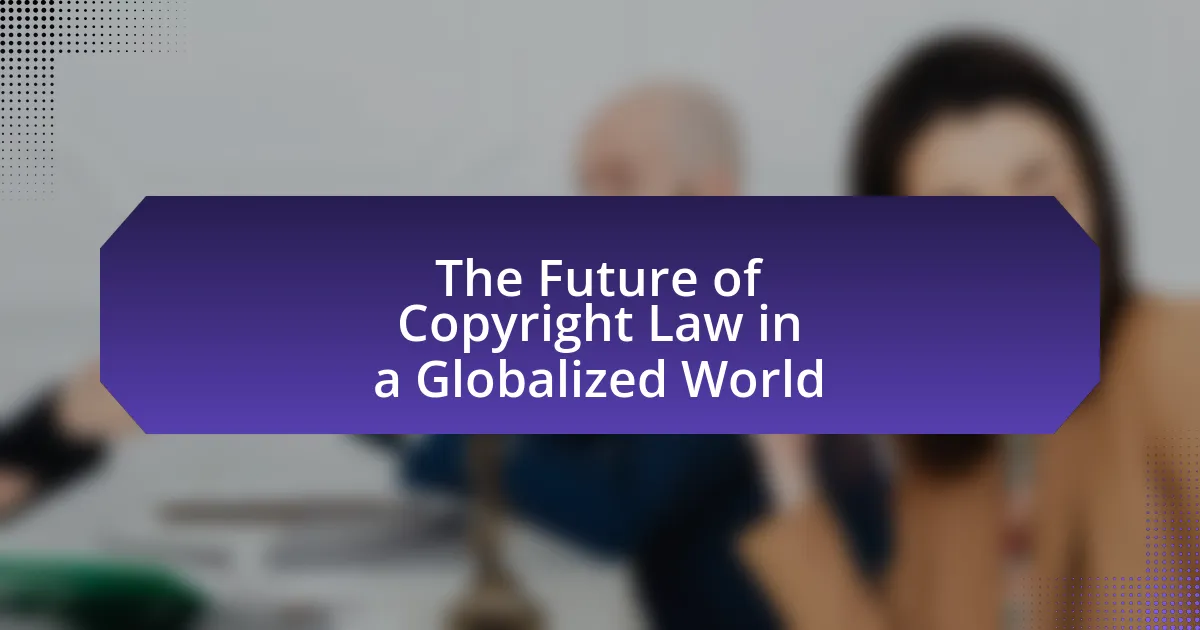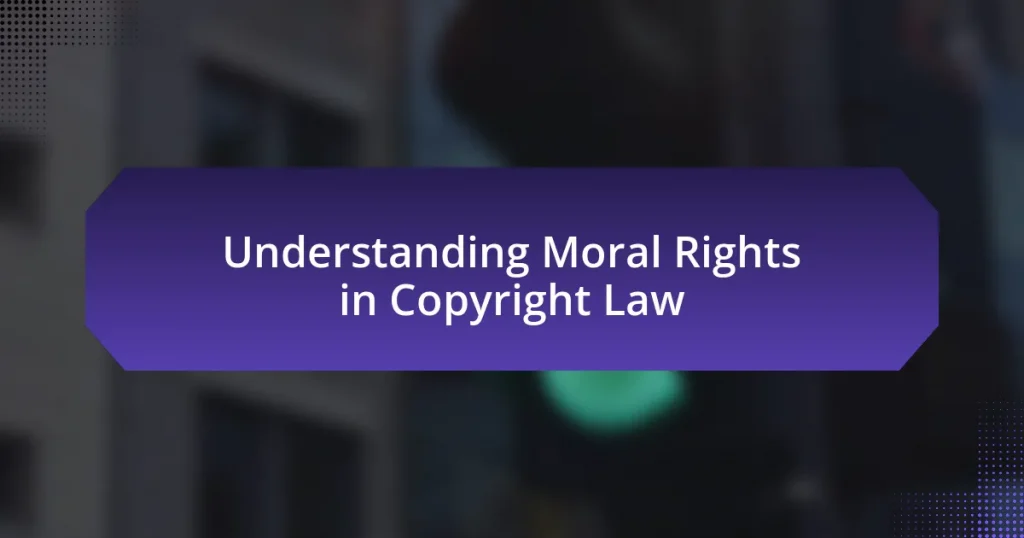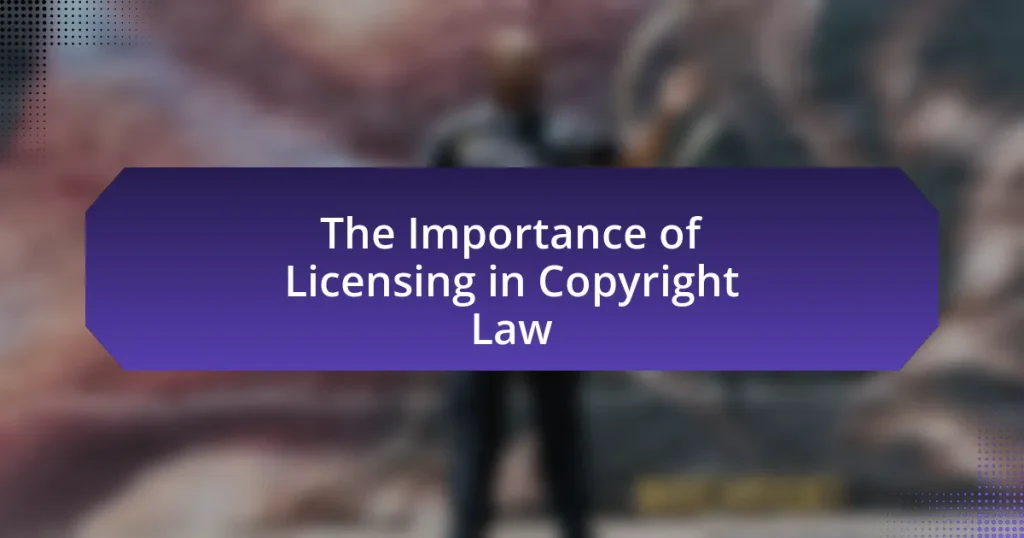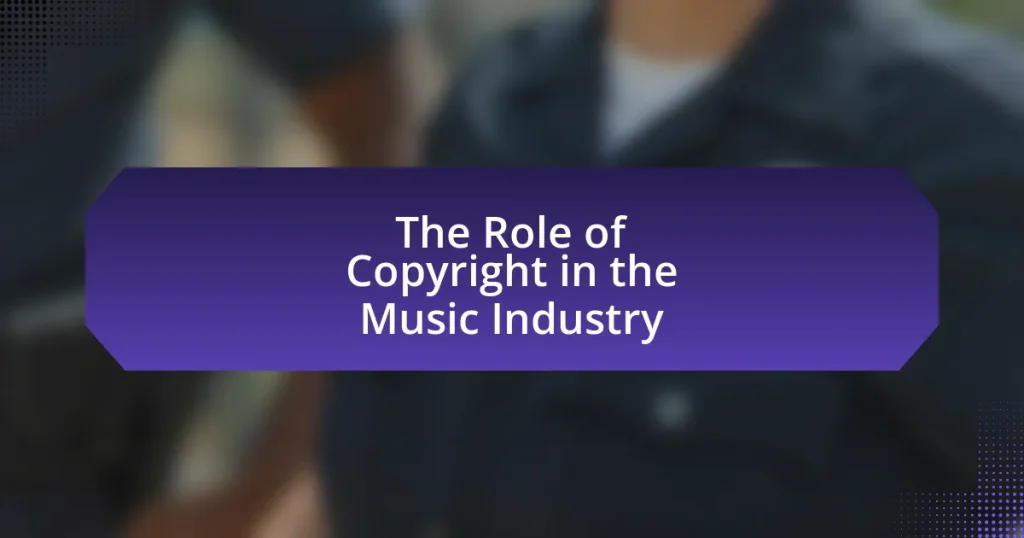The article examines the future of copyright law in a globalized world, highlighting the need for harmonization of international copyright standards and the impact of globalization on copyright enforcement. It discusses the challenges posed by varying copyright laws across jurisdictions, the role of international treaties like the Berne Convention and TRIPS Agreement, and the influence of technology, including blockchain and artificial intelligence, on copyright protection and enforcement. Additionally, the article addresses the implications of evolving copyright frameworks for creators and consumers, emphasizing the balance between protecting intellectual property rights and ensuring access to creative works in a digital landscape.
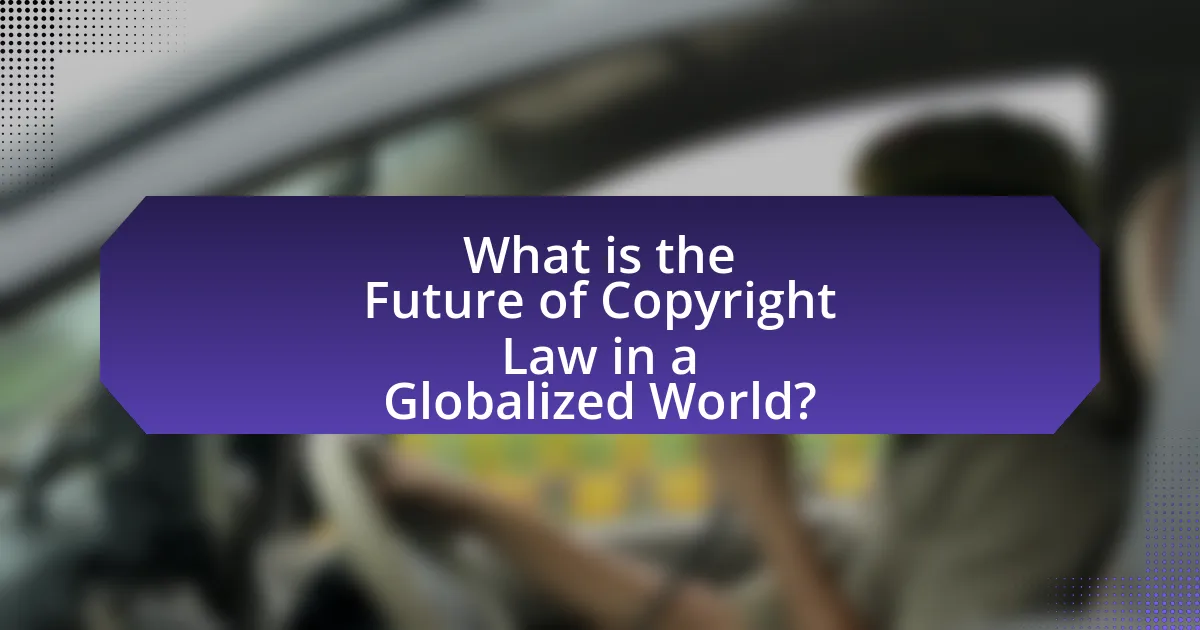
What is the Future of Copyright Law in a Globalized World?
The future of copyright law in a globalized world is likely to involve increased harmonization of international copyright standards and greater emphasis on digital rights management. As globalization facilitates cross-border access to creative works, countries are pressured to align their copyright laws to protect creators while accommodating the needs of consumers. For instance, the implementation of treaties like the Berne Convention and the TRIPS Agreement has already set a foundation for international copyright cooperation. Additionally, advancements in technology, such as blockchain, may provide new methods for tracking and enforcing copyright, ensuring that creators receive fair compensation in a digital marketplace.
How is globalization impacting copyright law?
Globalization is significantly impacting copyright law by creating a need for harmonization of legal frameworks across different jurisdictions. As international trade and digital content distribution expand, discrepancies in copyright laws can lead to challenges in enforcement and protection of intellectual property rights. For instance, the World Intellectual Property Organization (WIPO) has facilitated treaties like the Berne Convention, which aims to standardize copyright protections globally, thereby addressing issues arising from cross-border content sharing. This harmonization is essential as it helps mitigate piracy and ensures creators receive fair compensation regardless of where their work is accessed.
What are the key challenges posed by globalization to copyright enforcement?
Globalization poses significant challenges to copyright enforcement, primarily due to the ease of cross-border distribution of digital content. This rapid dissemination complicates jurisdictional issues, as copyright laws vary widely between countries, leading to difficulties in enforcing rights across different legal systems. For instance, the lack of harmonization in copyright laws can result in content being freely shared in one jurisdiction while being protected in another, undermining the rights of creators. Additionally, the rise of online platforms facilitates piracy and unauthorized distribution, making it harder for copyright holders to monitor and enforce their rights effectively. According to the International Intellectual Property Alliance, global losses from copyright infringement reached approximately $200 billion annually, highlighting the scale of the enforcement challenge in a globalized context.
How do international treaties influence copyright law in a global context?
International treaties significantly shape copyright law on a global scale by establishing standardized legal frameworks that member countries must adhere to. For instance, the Berne Convention for the Protection of Literary and Artistic Works mandates that signatory countries recognize and enforce copyright protections for works originating from other member states, thereby promoting uniformity in copyright law. Additionally, the Agreement on Trade-Related Aspects of Intellectual Property Rights (TRIPS) sets minimum standards for copyright protection, compelling countries to enhance their domestic laws to comply with international norms. These treaties facilitate cross-border enforcement of copyright, reduce piracy, and encourage international cooperation in protecting intellectual property rights, ultimately influencing how copyright law evolves in a globalized context.
What trends are shaping the future of copyright law?
Emerging technologies, globalization, and evolving consumer behavior are shaping the future of copyright law. The rise of digital platforms and streaming services has led to increased challenges in enforcing copyright, as content is easily shared and distributed across borders. Additionally, the implementation of artificial intelligence in content creation raises questions about authorship and ownership, necessitating updates to existing legal frameworks. Furthermore, international treaties and agreements, such as the Berne Convention and the TRIPS Agreement, are being scrutinized and potentially revised to address these modern challenges, reflecting the need for harmonization in copyright laws globally.
How is technology transforming copyright protection and enforcement?
Technology is transforming copyright protection and enforcement by enabling more efficient tracking, management, and enforcement of intellectual property rights. Digital tools such as blockchain provide immutable records of ownership and transactions, enhancing transparency and reducing piracy. Additionally, artificial intelligence algorithms can monitor online platforms for unauthorized use of copyrighted material, allowing for quicker identification and removal of infringing content. According to a 2021 report by the World Intellectual Property Organization, the use of technology in copyright enforcement has led to a significant increase in the detection of copyright infringements, demonstrating its effectiveness in protecting creators’ rights.
What role do digital platforms play in the evolution of copyright law?
Digital platforms significantly influence the evolution of copyright law by reshaping how content is created, distributed, and consumed. These platforms, such as YouTube, Spotify, and social media networks, have introduced new challenges and opportunities for copyright enforcement and protection. For instance, the rise of user-generated content has prompted legal frameworks to adapt, leading to the implementation of measures like the Digital Millennium Copyright Act (DMCA) in the United States, which provides a safe harbor for platforms that comply with copyright takedown requests. Furthermore, the European Union’s Copyright Directive aims to hold platforms accountable for the content they host, reflecting the need for updated regulations in response to digital realities. These developments illustrate how digital platforms are not only catalysts for change but also active participants in shaping copyright law to address the complexities of a globalized digital landscape.
Why is harmonization of copyright laws important in a globalized world?
Harmonization of copyright laws is important in a globalized world because it facilitates international trade and protects creators’ rights across borders. In a global economy, digital content is easily shared and distributed, making it essential for countries to adopt similar copyright standards to prevent legal conflicts and ensure that creators receive fair compensation for their work. For instance, the Berne Convention, which has been ratified by over 170 countries, establishes minimum standards for copyright protection, demonstrating the necessity of a unified approach to copyright law. This harmonization not only enhances cooperation among nations but also fosters innovation and creativity by providing a stable legal framework for creators worldwide.
What are the benefits of a unified approach to copyright law internationally?
A unified approach to copyright law internationally enhances legal clarity and consistency across borders, facilitating easier enforcement of rights. This consistency reduces the complexity for creators and businesses operating in multiple jurisdictions, allowing for streamlined licensing and distribution processes. For instance, the Berne Convention, which establishes minimum standards for copyright protection, exemplifies how international agreements can harmonize laws, thereby fostering a more predictable environment for copyright holders. Additionally, a unified framework can help combat piracy and infringement more effectively, as it allows for coordinated international efforts in enforcement, ultimately benefiting creators and consumers alike.
How can countries collaborate to address copyright issues effectively?
Countries can collaborate to address copyright issues effectively by establishing international treaties and frameworks that harmonize copyright laws. For instance, the Berne Convention for the Protection of Literary and Artistic Works provides a foundation for countries to recognize and enforce copyright across borders, ensuring that creators’ rights are protected globally. Additionally, countries can engage in information sharing and joint enforcement actions to combat piracy and infringement, as seen in initiatives like the Anti-Counterfeiting Trade Agreement (ACTA). These collaborative efforts can lead to more consistent legal standards and improved protection for intellectual property, ultimately fostering a more secure environment for creators worldwide.
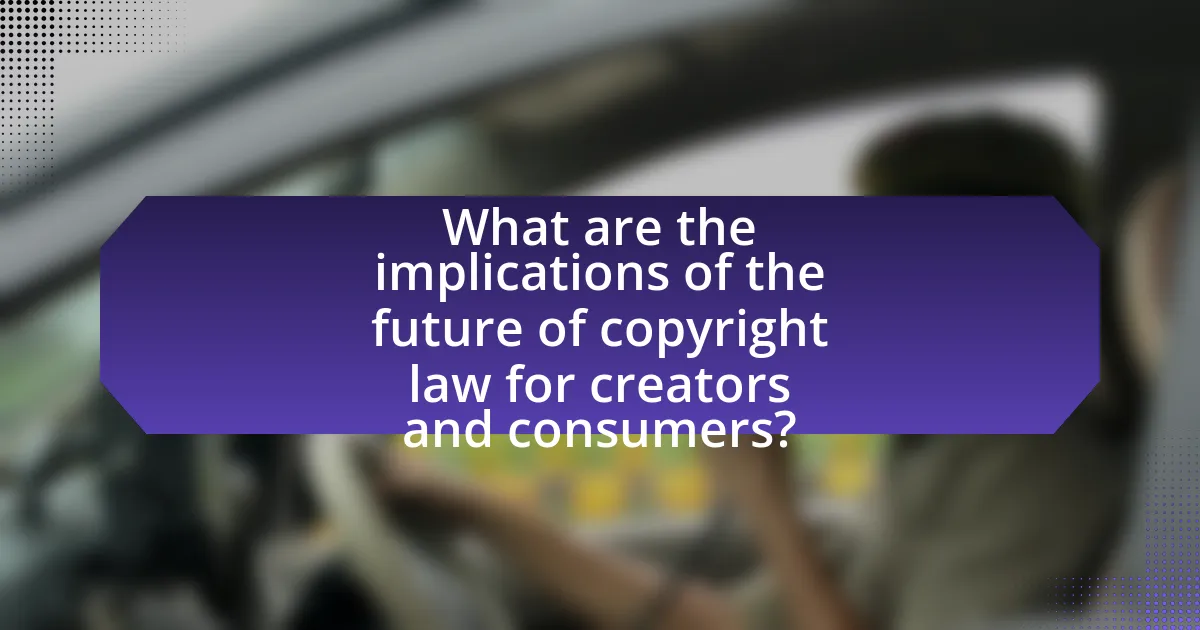
What are the implications of the future of copyright law for creators and consumers?
The future of copyright law will significantly impact both creators and consumers by redefining ownership, access, and distribution of creative works. For creators, evolving copyright frameworks may enhance protection against unauthorized use, ensuring they receive fair compensation for their work. For instance, the rise of digital rights management technologies aims to safeguard intellectual property in online environments, which can lead to increased revenue streams for artists and authors.
Conversely, consumers may face restrictions on access to content as copyright laws tighten, potentially limiting the availability of creative works. The balance between protecting creators’ rights and ensuring consumer access will be crucial; for example, the implementation of fair use provisions can allow consumers to engage with content without infringing on copyright.
Overall, the implications of future copyright law will hinge on the ongoing negotiation between safeguarding creators’ rights and promoting consumer access, shaping the landscape of creative industries in a globalized world.
How will changes in copyright law affect content creators?
Changes in copyright law will significantly impact content creators by altering their rights to control and monetize their work. For instance, stricter enforcement of copyright can enhance protection against unauthorized use, allowing creators to benefit financially from their original content. Conversely, more lenient laws may lead to increased sharing and remixing of content, which could dilute individual ownership and revenue streams. Historical data shows that the introduction of the Digital Millennium Copyright Act in 1998 led to a rise in copyright infringement cases, highlighting the ongoing tension between protection and accessibility in the digital age.
What protections will be available for creators in a globalized market?
Creators in a globalized market will have access to protections such as international copyright treaties, digital rights management, and national laws that align with global standards. International treaties like the Berne Convention and the Agreement on Trade-Related Aspects of Intellectual Property Rights (TRIPS) establish minimum standards for copyright protection across member countries, ensuring that creators’ works are recognized and protected internationally. Additionally, digital rights management technologies help safeguard digital content from unauthorized use, while national laws often incorporate these international standards, providing a legal framework for enforcement. This multi-layered approach enhances the ability of creators to protect their intellectual property rights globally.
How can creators adapt to evolving copyright landscapes?
Creators can adapt to evolving copyright landscapes by staying informed about changes in copyright laws and leveraging technology for protection and distribution. Continuous education on legal updates, such as the implementation of the Digital Millennium Copyright Act, enables creators to understand their rights and obligations. Additionally, utilizing digital rights management tools helps in safeguarding their work against unauthorized use. Engaging with legal professionals for advice on licensing agreements and copyright registration further ensures that creators can navigate the complexities of copyright in a globalized context.
What impact will future copyright laws have on consumers?
Future copyright laws will likely increase restrictions on consumer access to content. As governments and organizations seek to strengthen intellectual property protections, consumers may face limitations on sharing, modifying, or using digital content. For instance, the European Union’s Copyright Directive aims to enhance rights for creators but may inadvertently restrict user-generated content and fair use, impacting how consumers interact with media. Additionally, stricter enforcement of copyright could lead to higher costs for consumers, as content providers may raise prices to cover potential losses from piracy.
How will access to content change with new copyright regulations?
Access to content will become more restricted with new copyright regulations, as these laws aim to strengthen the protection of intellectual property rights. This shift may lead to increased enforcement against unauthorized use and sharing of content, limiting the availability of materials that were previously accessible. For instance, the European Union’s Copyright Directive, implemented in 2021, mandates that platforms must ensure copyright compliance, which could result in the removal of user-uploaded content that violates copyright. Consequently, users may face barriers in accessing diverse content, as platforms prioritize compliance over user-generated contributions.
What rights will consumers have under future copyright frameworks?
Consumers will have enhanced rights under future copyright frameworks, including expanded access to digital content, the right to share and remix works, and improved transparency regarding licensing terms. These rights are expected to evolve in response to technological advancements and the growing demand for user-generated content. For instance, the European Union’s Digital Single Market strategy aims to facilitate cross-border access to online content, which reflects a shift towards prioritizing consumer access and rights in copyright law.
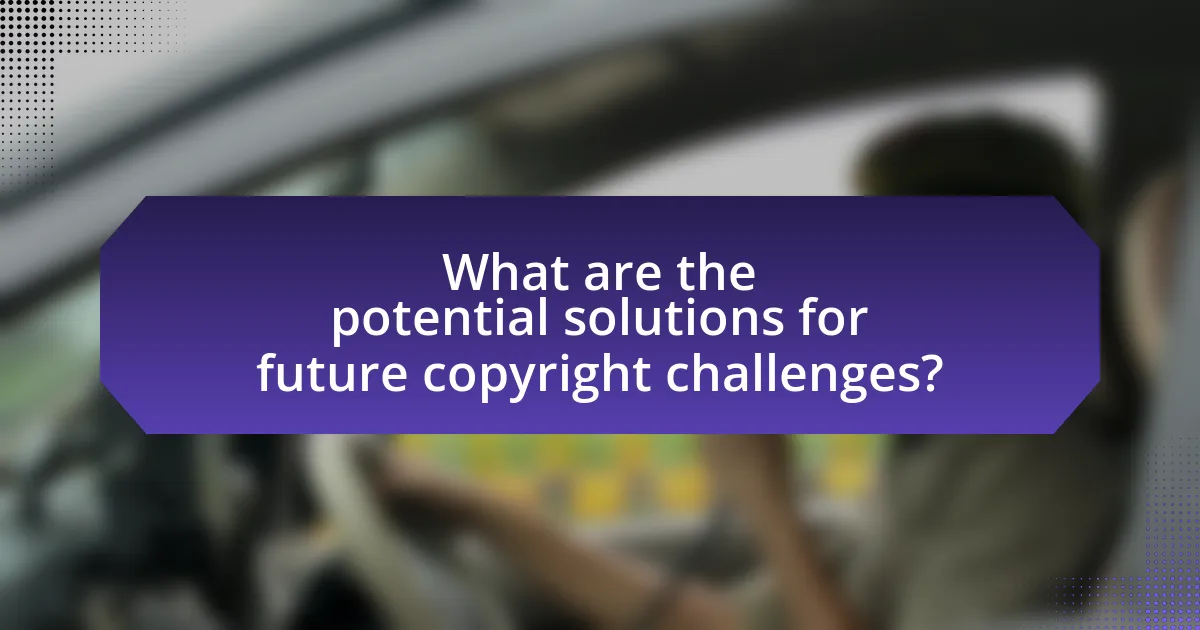
What are the potential solutions for future copyright challenges?
Potential solutions for future copyright challenges include the adoption of flexible licensing frameworks, the implementation of technology-based copyright enforcement, and the promotion of international cooperation on copyright laws. Flexible licensing frameworks, such as Creative Commons, allow creators to specify how their works can be used, which can reduce infringement while promoting sharing. Technology-based enforcement, including blockchain for tracking ownership and usage, can provide transparency and accountability in copyright management. Additionally, international cooperation, exemplified by treaties like the Berne Convention, can harmonize copyright laws across borders, addressing the complexities of a globalized digital environment. These solutions are supported by ongoing discussions among policymakers, legal experts, and industry stakeholders aimed at adapting copyright law to contemporary challenges.
How can technology aid in copyright protection?
Technology aids in copyright protection through digital rights management (DRM) systems, which control access to copyrighted content. These systems use encryption and licensing protocols to prevent unauthorized copying and distribution of digital media. For instance, platforms like Spotify and Netflix employ DRM to ensure that users can only access content under specific terms, thereby protecting the rights of creators. Additionally, blockchain technology offers a decentralized method for tracking ownership and usage rights, providing a transparent and tamper-proof record of copyright claims. This technological approach enhances the enforcement of copyright laws by making it easier to identify and address infringements.
What innovations are being developed to enhance copyright enforcement?
Innovations being developed to enhance copyright enforcement include blockchain technology, artificial intelligence, and digital watermarking. Blockchain technology provides a decentralized ledger that can securely track ownership and usage rights of creative works, making it easier to verify authenticity and prevent unauthorized use. Artificial intelligence is being utilized to monitor online content for copyright infringement, enabling faster identification and removal of pirated material. Digital watermarking embeds information within digital content, allowing for traceability and proof of ownership. These advancements collectively strengthen the ability to enforce copyright laws in an increasingly digital landscape.
How can blockchain technology be utilized in copyright management?
Blockchain technology can be utilized in copyright management by providing a decentralized and immutable ledger for recording ownership and usage rights of creative works. This technology enables artists and creators to register their works on the blockchain, ensuring that their intellectual property is securely documented and easily verifiable. For instance, platforms like Myco and Po.et leverage blockchain to create a transparent record of copyright claims, which can help prevent unauthorized use and facilitate licensing agreements. The use of smart contracts on blockchain can automate royalty payments, ensuring that creators receive compensation in real-time whenever their work is used. This approach not only enhances the protection of copyright but also streamlines the management process, making it more efficient and accessible for creators worldwide.
What best practices can stakeholders adopt to navigate future copyright laws?
Stakeholders can adopt proactive legal compliance, continuous education, and collaborative engagement as best practices to navigate future copyright laws. Proactive legal compliance involves staying informed about changes in copyright legislation and ensuring that all content usage adheres to current laws, which is crucial given the rapid evolution of digital media and international treaties. Continuous education on copyright issues, including attending workshops and utilizing online resources, helps stakeholders understand their rights and responsibilities, thereby reducing the risk of infringement. Collaborative engagement with industry peers and legal experts fosters a shared understanding of best practices and encourages the development of standards that can adapt to future changes in copyright law. These practices are essential as copyright laws are increasingly influenced by technological advancements and globalization, necessitating a dynamic approach to compliance and advocacy.
How can creators and businesses stay informed about copyright changes?
Creators and businesses can stay informed about copyright changes by subscribing to legal newsletters, following relevant government agencies, and participating in industry associations. Legal newsletters often provide updates on legislative changes and case law, while agencies like the U.S. Copyright Office publish official announcements and guidelines. Additionally, industry associations frequently host seminars and webinars that discuss recent developments in copyright law, ensuring that members are aware of important changes. These methods are effective as they provide timely and accurate information directly from authoritative sources.
What strategies can be implemented to ensure compliance with evolving laws?
To ensure compliance with evolving laws, organizations should implement a proactive legal monitoring system. This system involves regularly reviewing and analyzing changes in legislation, regulations, and case law relevant to their operations. For instance, companies can utilize legal technology tools that track updates in real-time, allowing them to adapt their policies and practices accordingly. Additionally, conducting regular training sessions for employees on compliance requirements fosters a culture of awareness and accountability. Research indicates that organizations with robust compliance training programs experience a 50% reduction in compliance violations, demonstrating the effectiveness of such strategies.
